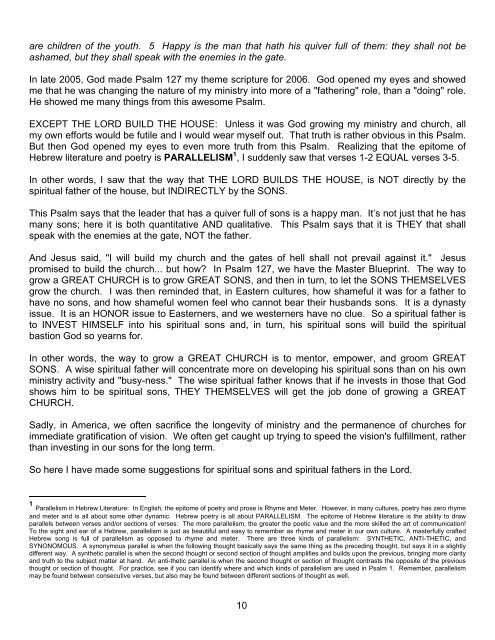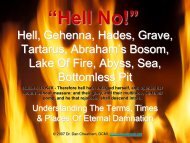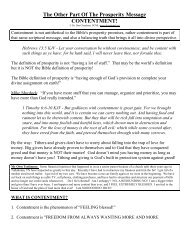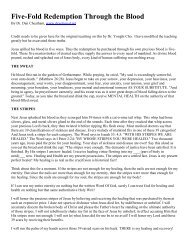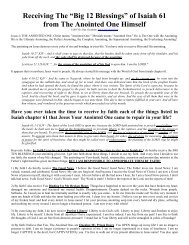Apostolic Alignment - FaithSite.com
Apostolic Alignment - FaithSite.com
Apostolic Alignment - FaithSite.com
You also want an ePaper? Increase the reach of your titles
YUMPU automatically turns print PDFs into web optimized ePapers that Google loves.
are children of the youth. 5 Happy is the man that hath his quiver full of them: they shall not be<br />
ashamed, but they shall speak with the enemies in the gate.<br />
In late 2005, God made Psalm 127 my theme scripture for 2006. God opened my eyes and showed<br />
me that he was changing the nature of my ministry into more of a "fathering" role, than a "doing" role.<br />
He showed me many things from this awesome Psalm.<br />
EXCEPT THE LORD BUILD THE HOUSE: Unless it was God growing my ministry and church, all<br />
my own efforts would be futile and I would wear myself out. That truth is rather obvious in this Psalm.<br />
But then God opened my eyes to even more truth from this Psalm. Realizing that the epitome of<br />
Hebrew literature and poetry is PARALLELISM 1 , I suddenly saw that verses 1-2 EQUAL verses 3-5.<br />
In other words, I saw that the way that THE LORD BUILDS THE HOUSE, is NOT directly by the<br />
spiritual father of the house, but INDIRECTLY by the SONS.<br />
This Psalm says that the leader that has a quiver full of sons is a happy man. It’s not just that he has<br />
many sons; here it is both quantitative AND qualitative. This Psalm says that it is THEY that shall<br />
speak with the enemies at the gate, NOT the father.<br />
And Jesus said, "I will build my church and the gates of hell shall not prevail against it." Jesus<br />
promised to build the church... but how? In Psalm 127, we have the Master Blueprint. The way to<br />
grow a GREAT CHURCH is to grow GREAT SONS, and then in turn, to let the SONS THEMSELVES<br />
grow the church. I was then reminded that, in Eastern cultures, how shameful it was for a father to<br />
have no sons, and how shameful women feel who cannot bear their husbands sons. It is a dynasty<br />
issue. It is an HONOR issue to Easterners, and we westerners have no clue. So a spiritual father is<br />
to INVEST HIMSELF into his spiritual sons and, in turn, his spiritual sons will build the spiritual<br />
bastion God so yearns for.<br />
In other words, the way to grow a GREAT CHURCH is to mentor, empower, and groom GREAT<br />
SONS. A wise spiritual father will concentrate more on developing his spiritual sons than on his own<br />
ministry activity and "busy-ness." The wise spiritual father knows that if he invests in those that God<br />
shows him to be spiritual sons, THEY THEMSELVES will get the job done of growing a GREAT<br />
CHURCH.<br />
Sadly, in America, we often sacrifice the longevity of ministry and the permanence of churches for<br />
immediate gratification of vision. We often get caught up trying to speed the vision's fulfillment, rather<br />
than investing in our sons for the long term.<br />
So here I have made some suggestions for spiritual sons and spiritual fathers in the Lord.<br />
1 Parallelism in Hebrew Literature: In English, the epitome of poetry and prose is Rhyme and Meter. However, in many cultures, poetry has zero rhyme<br />
and meter and is all about some other dynamic. Hebrew poetry is all about PARALLELISM. The epitome of Hebrew literature is the ability to draw<br />
parallels between verses and/or sections of verses: The more parallelism, the greater the poetic value and the more skilled the art of <strong>com</strong>munication!<br />
To the sight and ear of a Hebrew, parallelism is just as beautiful and easy to remember as rhyme and meter in our own culture. A masterfully crafted<br />
Hebrew song is full of parallelism as opposed to rhyme and meter. There are three kinds of parallelism: SYNTHETIC, ANTI-THETIC, and<br />
SYNONOMOUS. A synonymous parallel is when the following thought basically says the same thing as the preceding thought, but says it in a slightly<br />
different way. A synthetic parallel is when the second thought or second section of thought amplifies and builds upon the previous, bringing more clarity<br />
and truth to the subject matter at hand. An anti-thetic parallel is when the second thought or section of thought contrasts the opposite of the previous<br />
thought or section of thought. For practice, see if you can identify where and which kinds of parallelism are used in Psalm 1. Remember, parallelism<br />
may be found between consecutive verses, but also may be found between different sections of thought as well.<br />
10


